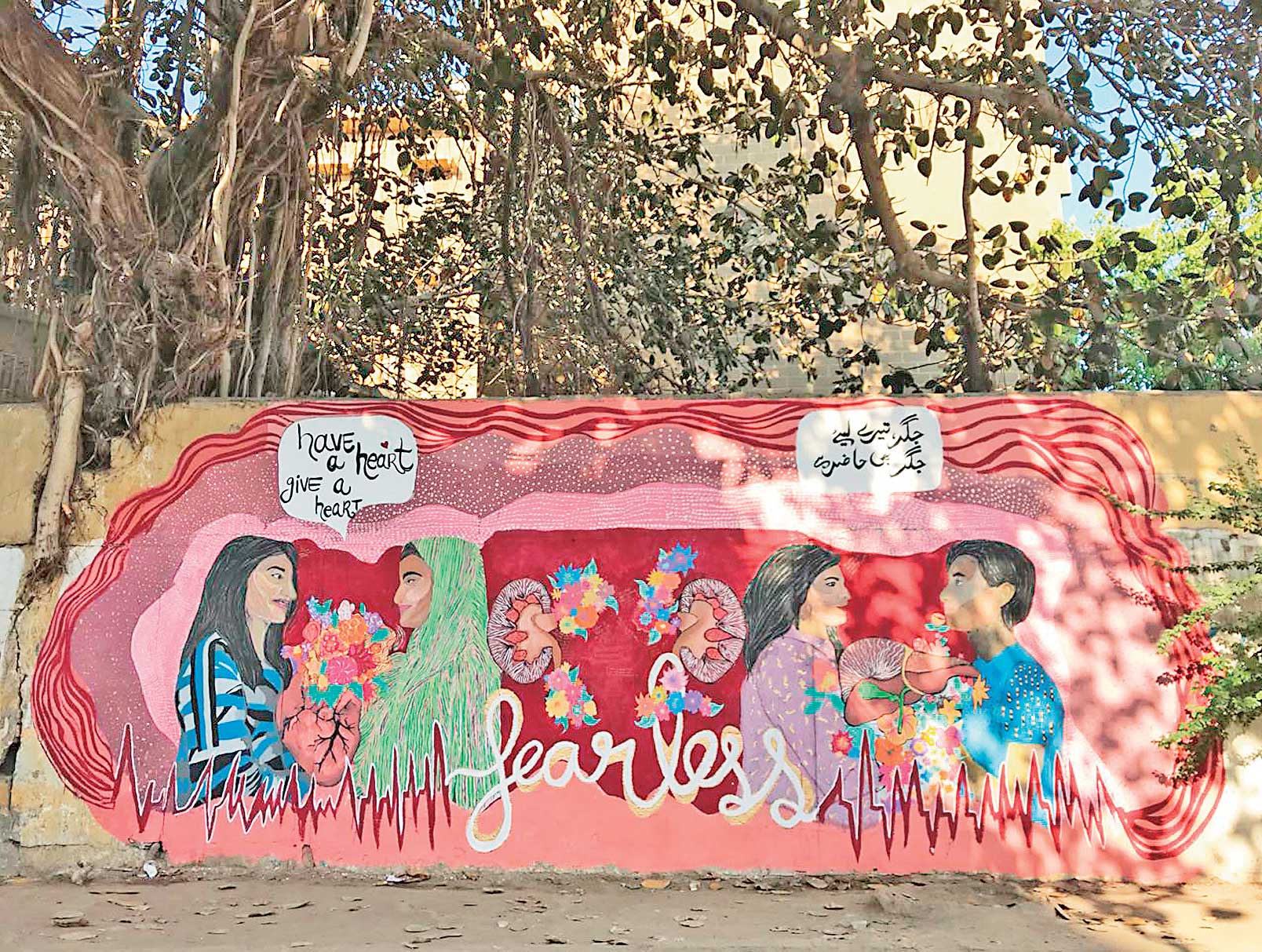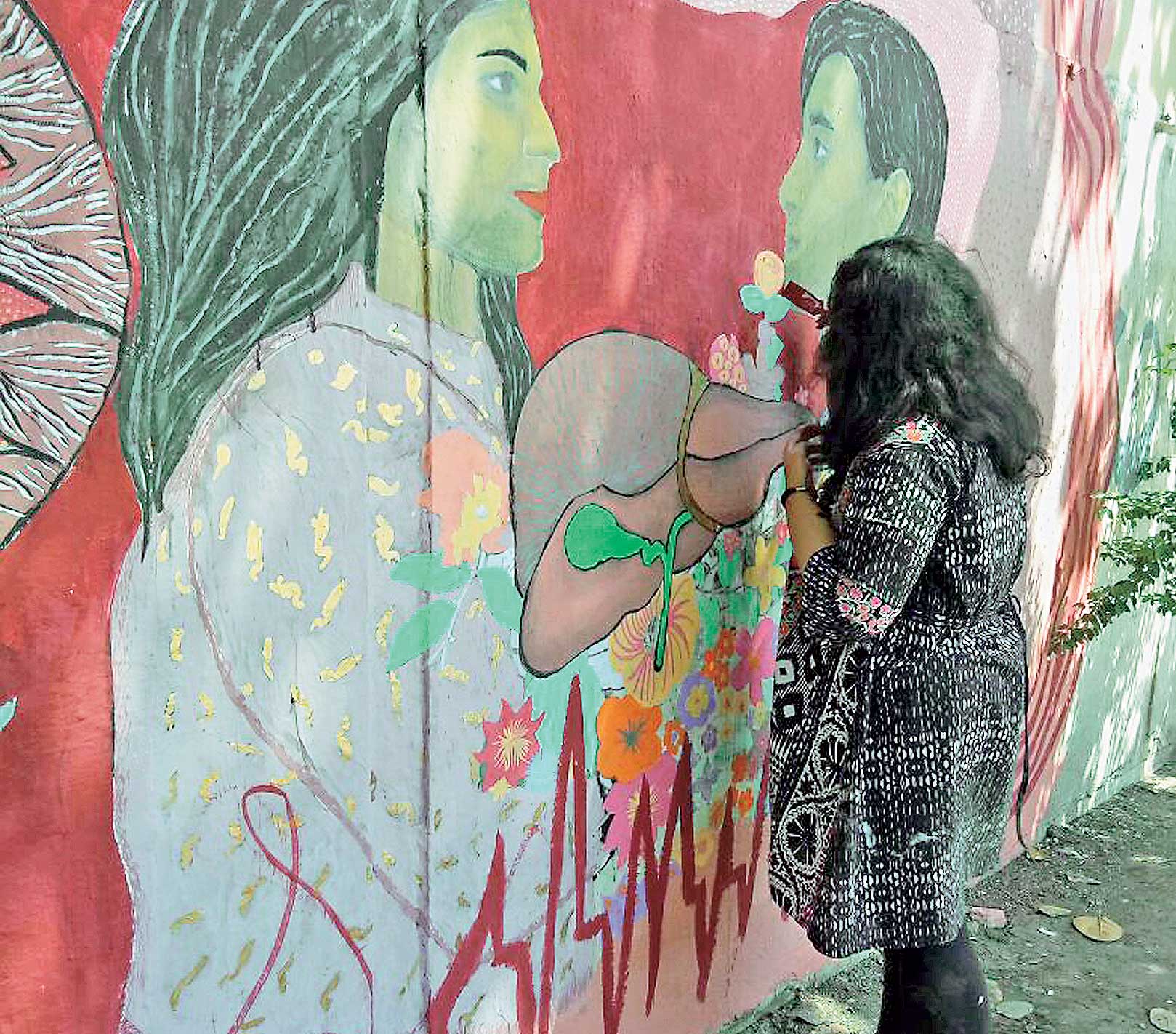Painting murals to start a conversation about organ donation
A few feet away from the Dow Medical College, a group of women are busy painting four side portraits on a wall, between them speech bubbles emerging from colourful organs.
The wall, situated along the busy Baba-e-Urdu Road, can be seen from many points. The mural is part of an initiative to start a conversation about organ donation, a topic many avert their gaze from.
Documentary film-maker Haya Fatima Iqbal, currently teaching the ‘Communication for Social Change’ course at the Habib University, conceived the idea and then asked Nida Mushtaq of the Fearless Collective to translate it as a mural.
“I used to ask my students to pick social issues and then create theatre, but this time round I chose the issue for them,” Haya told The News. “I chose organ donation because it’s often ignored in the country. Up to 150,000 people lose their lives each year because they’re unable to find a liver or a kidney to survive.” She said the state has its own registry, and people can go online to register themselves as organ donors. “Not everyone can donate their organs because their condition is also important.”
Haya pointed out that there are numerous fatal accidents every day in Karachi alone, but the concept of organ donation is non-existent. “We don’t even have the culture of starting a conversation about this.”
She added that together with the Fearless Collective, they have started from a mural and they also aim to make short documentaries to raise awareness. “Not many people can access the internet, but this wall is accessible to everyone who passes by it.”
Hafsa Ghani, a student enrolled on the ‘Communication for Social Change’ course, said their group received firsthand information about the current scenario of organ donation. “There have been few donations ever since legislation was passed in 2010, so I feel this initiative will at least start a conversation.”
Haya drew attention to the fact that many people are unaware of the procedure to become an organ donor and that access to information is equally important. “We have also painted the helpline number so people can just pick up their phone and register themselves. The process is very simple.”
The documentary film-maker said some people are uncomfortable thinking about organ donation, using culture and religion as shields, when in reality they are simply being selfish. Nida Mushtaq of the Fearless Collective, a group of South Asian artists who usually paint murals from a gender perspective, said she decided to get on board because of the larger context of the idea.
“Even though it doesn’t necessarily fall under the work we have produced previously, in a larger context the objective of the Fearless Collective is to create spaces. Women are reclaiming public spaces and this group of women wanted to use another method of storytelling.”
She said this is participative public art, and they want more women to adopt this way of taking art to the streets, adding that this is the reason they are running their public art residency in South Asia later this year.
Nida said the Fearless Collective uses storytelling and representation, focusing on symbols during their work that have a deeper meaning to them. “Organ donation is important because who knows we might be in that position someday, needing someone’s help.” Similarly, she added, when women are harassed, other women rise even if they have not experienced it, “because empathy plays a larger role here. It’s about the possibility that the tables could turn someday”.
She said her experience was overwhelming. “Just a few feet away there is a place where people wait for organ donation month after month. I hope the mural will spark a conversation leading to registration of more donors.”
-
 Eric Dane's Girlfriend Janell Shirtcliff Pays Him Emotional Tribute After ALS Death
Eric Dane's Girlfriend Janell Shirtcliff Pays Him Emotional Tribute After ALS Death -
 King Charles Faces ‘stuff Of The Nightmares’ Over Jarring Issue
King Charles Faces ‘stuff Of The Nightmares’ Over Jarring Issue -
 Sarah Ferguson Has ‘no Remorse’ Over Jeffrey Epstein Friendship
Sarah Ferguson Has ‘no Remorse’ Over Jeffrey Epstein Friendship -
 A$AP Rocky Throws Rihanna Surprise Birthday Dinner On Turning 38
A$AP Rocky Throws Rihanna Surprise Birthday Dinner On Turning 38 -
 Andrew Jokes In Hold As BAFTA Welcomes Prince William
Andrew Jokes In Hold As BAFTA Welcomes Prince William -
 Sam Levinson Donates $27K To Eric Dane Family Fund After Actor’s Death
Sam Levinson Donates $27K To Eric Dane Family Fund After Actor’s Death -
 Savannah Guthrie Mother Case: Police Block Activist Mom Group Efforts To Search For Missing Nancy Over Permission Row
Savannah Guthrie Mother Case: Police Block Activist Mom Group Efforts To Search For Missing Nancy Over Permission Row -
 Dove Cameron Calls '56 Days' Casting 'Hollywood Fever Dream'
Dove Cameron Calls '56 Days' Casting 'Hollywood Fever Dream' -
 Prince William, Kate Middleton ‘carrying Weight’ Of Reputation In Epstein Scandal
Prince William, Kate Middleton ‘carrying Weight’ Of Reputation In Epstein Scandal -
 Timothée Chalamet Compares 'Dune: Part Three' With Iconic Films 'Interstellar', 'The Dark Knight' & 'Apocalypse Now'
Timothée Chalamet Compares 'Dune: Part Three' With Iconic Films 'Interstellar', 'The Dark Knight' & 'Apocalypse Now' -
 Little Mix Star Leigh-Anne Pinnock Talks About Protecting Her Children From Social Media
Little Mix Star Leigh-Anne Pinnock Talks About Protecting Her Children From Social Media -
 Ghislaine Maxwell Is ‘fall Guy’ For Jeffrey Epstein, Claims Brother
Ghislaine Maxwell Is ‘fall Guy’ For Jeffrey Epstein, Claims Brother -
 Timothee Chalamet Rejects Fame Linked To Kardashian Reality TV World While Dating Kylie Jenner
Timothee Chalamet Rejects Fame Linked To Kardashian Reality TV World While Dating Kylie Jenner -
 Sarah Chalke Recalls Backlash To 'Roseanne' Casting
Sarah Chalke Recalls Backlash To 'Roseanne' Casting -
 Pamela Anderson, David Hasselhoff's Return To Reimagined Version Of 'Baywatch' Confirmed By Star
Pamela Anderson, David Hasselhoff's Return To Reimagined Version Of 'Baywatch' Confirmed By Star -
 Willie Colón, Salsa Legend, Dies At 75
Willie Colón, Salsa Legend, Dies At 75





